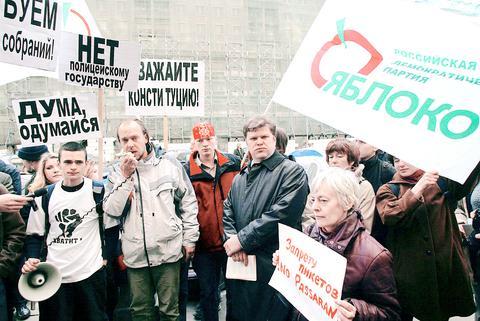The Russian Parliament took the first step on Wednesday toward passing a law that would ban demonstrations in most public places, narrowing one of the crucial freedoms won as the Soviet Union came to an end.
The bill passed the first of three readings by a vote of 294 to 137, reflecting the dominance of supporters of President Vladimir Putin.

PHOTO: AP
The draft law prohibits rallies outside government buildings, embassies and international organizations, on major roads, near schools, hospitals, stadiums, concert halls and religious centers, and at pipelines and environmentally hazardous sites.
"This would be the end of political life in the streets," said Sergei Reshulsky, a member of the Communist Party, which has asserted itself over the years in street rallies.
The liberal Yabloko Party, which was shut out of Parliament in an election in November, protested, saying, "The bill is aimed at eliminating the right of citizens for peaceful meetings, demonstrations and pickets" granted by the country's constitution.
Yabloko Party members were among the demonstrators who rallied outside Parliament with signs reading, "No to a police state." Rally organizers had not obtained the necessary permit, and the demonstration was broken up by the police.
Several demonstrators were briefly detained, including the deputy head of Yabloko, Sergei Mitrokhin.
Proponents of the bill said it would help ensure national security and public order, issues that had contributed to Putin's popularity during the March 14 election, in which he won an overwhelming majority.
The leader of the president's parliamentary bloc, Boris Gryzlov, said that there would still be plenty of places to hold demonstrations and that formal permission would no longer be required, only advance notice.
The proposed law, however, contains a clause that would allow officials to block any gatherings if "their aim contradicted the constitution, generally accepted norms of public morality and federal law."
Advocates for democracy and human rights have grown worried in recent months as Putin has tightened control of the news media and restricted serious political opposition.
But a number of recent public opinion polls show that there is a constituency for restrictive measures. Most people appear to favor a strong central government that would limit their freedoms, including the imposition of censorship.

Kehinde Sanni spends his days smoothing out dents and repainting scratched bumpers in a modest autobody shop in Lagos. He has never left Nigeria, yet he speaks glowingly of Burkina Faso military leader Ibrahim Traore. “Nigeria needs someone like Ibrahim Traore of Burkina Faso. He is doing well for his country,” Sanni said. His admiration is shaped by a steady stream of viral videos, memes and social media posts — many misleading or outright false — portraying Traore as a fearless reformer who defied Western powers and reclaimed his country’s dignity. The Burkinabe strongman swept into power following a coup in September 2022

‘FRAGMENTING’: British politics have for a long time been dominated by the Labor Party and the Tories, but polls suggest that Reform now poses a significant challenge Hard-right upstarts Reform UK snatched a parliamentary seat from British Prime Minister Keir Starmer’s Labor Party yesterday in local elections that dealt a blow to the UK’s two establishment parties. Reform, led by anti-immigrant firebrand Nigel Farage, won the by-election in Runcorn and Helsby in northwest England by just six votes, as it picked up gains in other localities, including one mayoralty. The group’s strong showing continues momentum it built up at last year’s general election and appears to confirm a trend that the UK is entering an era of multi-party politics. “For the movement, for the party it’s a very, very big

ENTERTAINMENT: Rio officials have a history of organizing massive concerts on Copacabana Beach, with Madonna’s show drawing about 1.6 million fans last year Lady Gaga on Saturday night gave a free concert in front of 2 million fans who poured onto Copacabana Beach in Rio de Janeiro for the biggest show of her career. “Tonight, we’re making history... Thank you for making history with me,” Lady Gaga told a screaming crowd. The Mother Monster, as she is known, started the show at about 10:10pm local time with her 2011 song Bloody Mary. Cries of joy rose from the tightly packed fans who sang and danced shoulder-to-shoulder on the vast stretch of sand. Concert organizers said 2.1 million people attended the show. Lady Gaga

SUPPORT: The Australian prime minister promised to back Kyiv against Russia’s invasion, saying: ‘That’s my government’s position. It was yesterday. It still is’ Left-leaning Australian Prime Minister Anthony Albanese yesterday basked in his landslide election win, promising a “disciplined, orderly” government to confront cost-of-living pain and tariff turmoil. People clapped as the 62-year-old and his fiancee, Jodie Haydon, who visited his old inner Sydney haunt, Cafe Italia, surrounded by a crowd of jostling photographers and journalists. Albanese’s Labor Party is on course to win at least 83 seats in the 150-member parliament, partial results showed. Opposition leader Peter Dutton’s conservative Liberal-National coalition had just 38 seats, and other parties 12. Another 17 seats were still in doubt. “We will be a disciplined, orderly